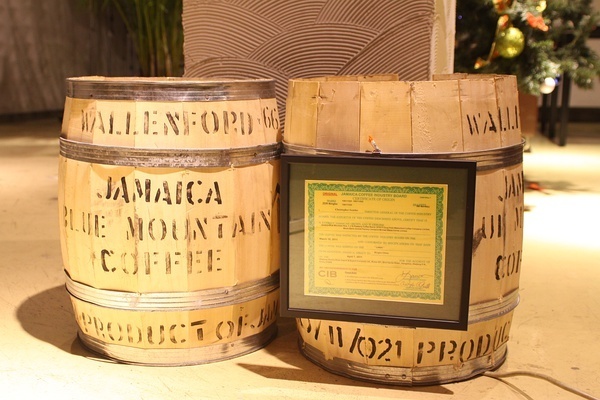The elegant temperament in Blue Mountain Coffee

Blue Mountain Coffee has always been very popular in the Asian market. In particular, Japanese coffee merchants have monopolized it for decades, feeling that they do not know it. Many of our understanding of Blue Mountain Coffee only stays in the books and periodicals written by the Japanese, or people's praise for it by word of mouth.
The advantages and disadvantages of Blue Mountain Coffee are mainly shown in the following aspects:
First, variety. There is no doubt that Blue Mountain Coffee belongs to Arabica, but it is commendable that it is a traditional typica variety in Abika coffee. This alone is enough to make it stand out from the crowd. We know that when coffee is introduced from Ethiopia to the Arab region. Arabica coffee is famous for three traditional varieties (typica, bourbon and mocha). Although these three traditions, or primitive Arabica coffee, are not satisfactory in terms of high yield, stable yield and disease resistance, their flavor is still so excellent that it is worth pursuing. Some people even say that the taste of today's Arabica coffee is far inferior to that of these three traditional varieties.
Today, in countries that produce high-quality Arabica coffee, people use hybrid varieties created by artificial technology, biotechnology, and even cloning technology in order to obtain economic benefits such as high yield, stable yield and disease tolerance. the flavor of its coffee is far inferior to these three seemingly primitive and delicate coffee varieties. And Jamaica Blue Mountain Coffee belongs to this kind of coffee which retains the original typica pure pedigree. Perhaps people can say that the technology of coffee agriculture in Jamaica is underdeveloped. Maybe so, but the unique flavor of Blue Mountain typica comes from its original and pure variety.
Second, at a time when the boutique coffee movement is in the ascendant, especially when the concept of manor coffee is springing up all over the world, coffee produced in some newly discovered excellent estates and those newly cultivated excellent coffee varieties may be particularly eye-catching and refreshing in some taste characteristics. But personally, I think it is not as introverted and elegant as the real Manor extreme Blue Mountain Coffee.
In fact, Blue Mountain Coffee is not as strong aroma, beautiful fruit aroma and long and strong aftertaste as many friends think. Everything it comes is so introverted and down-to-earth, soft and implicit, rich and long-lasting. None of the flavors are overly exaggerated and abrupt. Maybe some people say today that Blue Mountain Coffee is nothing more than that. But if you can calm down and drink slowly, you will feel the elegance and richness that lingers in a plain state. It may not be very eye-catching, but it requires you to appreciate it professionally in order to feel that it is so extraordinary.
Third, Blue Mountain Coffee is not as famous in today's international coffee market as we Asians think. From Uncle Dou's experience, there is no Blue Mountain Coffee in many countries in Europe. Even Uncle Dou's two elderly teachers baked Blue Mountain coffee only when they were young, with the exception of England. Higgen's Coffee Roasters in London is one of the few European coffee roasting shops that roast the Blue Mountains. In fact, this is not surprising. The best part of the first wave of Blue Mountain that is really famous in the world comes from Britain, not Japan as we all imagine. But with the decline of the sunset empire, Jamaican Blue Mountain Coffee nearly hit rock bottom. When CIB was founded in 1948, their original intention was to revive the international status of Jamaican Blue Mountain Coffee. But what they are waiting for is not the old British employer, but Japan, a coffee powerhouse as far away as Asia.
The taste of Blue Mountain Coffee is very suitable for Asians. Mellow, gentle sour, with a sweet aftertaste, low bitterness. All this makes the famous coffee companies in Japan monopolize it at a large amount of money, and launch it after packaging it with extremely fierce market behavior, making it shine much better than in the past in Britain. But the Japanese move is clearly based on rigorous market analysis. Because it is in line with the Japanese and even Asian understanding and unique positioning of a good cup of coffee. Today, CIB began its promotion work in the Chinese market. Some people say that Chinese coffee Fans is blessed. In fact, this is due to the continuous downturn in the Japanese economy after the US subprime mortgage crisis. Especially after the earthquake in Japan, its depressed economic situation has become even worse. Orders from many famous coffee producing areas have been cancelled in Japan. The reduction in the import of Blue Mountain coffee is the first to bear the brunt. At this time, CIB set his sights on China. They hope to find a platform for Blue Mountain Coffee to take off at the third level after Britain and Japan.
Important Notice :
前街咖啡 FrontStreet Coffee has moved to new addredd:
FrontStreet Coffee Address: 315,Donghua East Road,GuangZhou
Tel:020 38364473
- Prev

Introduction to the Grade characteristics of Ethiopian Yega Xuefei Coffee beans description of the sour taste of hand-made Yega Coffee
Yirgacheffe coffee raw bean is one of the most distinctive coffee in the world. It is rare and expensive. It is produced in the plateau of Ethiopia's sidamo province, which is 4000 feet above sea level. It is an outstanding representative of African washed coffee, with unique citrus and lemon water.
- Next

Chinese Coffee--Pu 'er Coffee
Zhang Kui, a farmer from Dakaihe Donghui Forest Society in Nanping Town, Simao District, Pu 'er City, is drying coffee beans in front of a newly built house. There are 19 coffee farmers in the village, and every family is harvesting the joy of harvest. At the coffee purchasing station, coffee of the quality meeting the purchasing requirements is replaced into uniform packaging bags and stored for shipment. Zhang Kui uses a machine to peel coffee fresh fruit in his yard. now is
Related
- Guji coffee producing area of Guji, Ethiopia: Humbela, Shakiso, Wulaga
- What is the most expensive variety of Qiloso in BOP multi-variety group?
- How to store the coffee beans bought home?
- Why are Yemeni coffee beans so rare now?
- Ethiopian Sidamo all Red Fruit Sun Sun Santa Vini Coffee beans
- SOE is mostly sour? What does it mean? Is it a single bean? what's the difference between it and Italian blending?
- Is Italian coffee beans suitable for making hand-brewed coffee?
- How to choose coffee beans when making cold coffee? What kind of coffee beans are suitable for making cold coffee?
- Just entered the pit to make coffee, what kind of coffee beans should be chosen?
- Can only Japan buy real Blue Mountain Coffee? What are authentic Jamaican Blue Mountain coffee beans?

